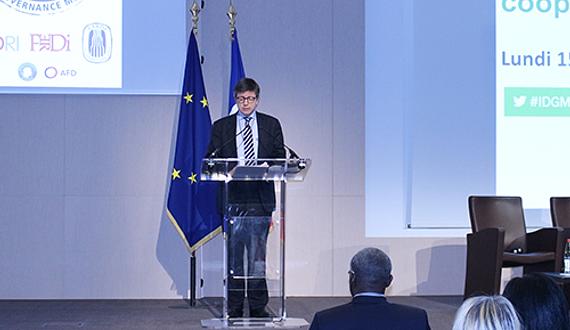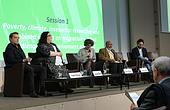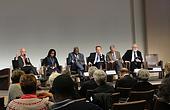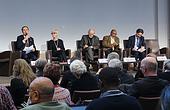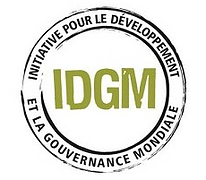.png)
Alongside development investment, tackling insecurity remains a key component of the international agenda. The dialectic between crisis or conflict management and development processes has been a long-standing challenge for cooperation with the developing countries. Climate change and growing insecurity in some parts of the world are likely to increase the difficulty of taking action. What are the linkages between conflict resolution, climate mitigation and development? How, in this context, can a new cooperation policy be defined for France and for Europe?
To contribute to the issue, FERDI and IDDRI, meeting within the Initiative for Development and Global Governance (IDGM), which has been supported by the French Development Agency since 2007, as well as CERDI, associated with IDGM+, which received the French “Laboratoire d’Excellence” label in 2011, organised the conference: “Development, climate and security: challenges for a new cooperation policy”,
The event brought together policymakers and public authorities from the global North and South, as well as stakeholders and experts in international relations and sustainable development.
With presentations of original work by:
With participation of:
9:00-9:10 - Welcome
9:10-9:30 - Opening of the conference
9:30-11:00 - Session 1
Poverty, climate, insecurity: respective and combined impact on migration – What challenges for development policies?
The goal of this session was to take stock of the linkages between, on the one hand, poverty and inequalities, political or military conflicts and the impacts of climate change and, on the other hand, the different types of migration (international migration to Europe, but also intra-regional, intra-national and commuter migration, etc.).
This particularly implies clarifying the different types of migration, the various factors causing migration, and the linkages between migration and the development of home territories and of host territories and countries. The session was also the opportunity to discuss the importance of distinguishing between forced migration and migration as an adaptation strategy in the face of political, climate or economic shocks.
Panellists:
11:15–12:45 - Session 2
Do security and environmental risks challenge the analysis and design of development projects?
The aim of this session was to discuss the impact of risks connected to security and political or military conflicts, but also to climate change (including for the sharing of natural resources) on the identification, design and implementation of development projects. In addition to addressing these risks in terms of project evaluation, the session aimed to clarify how development interventions (at the project or policy level) can help to reduce these risks. The linkages between humanitarian approaches, military approaches and development approaches were discussed during this session.
Panellists:
2:00–3:30 - Session 3
Financing for development, security and climate: respective shares, synergies, competition or complementarity?
This session aimed to identify the inevitable trade-offs between financing for development, for security and for climate mitigation. It was the opportunity to discuss choices concerning the allocation or targeting of public and private financing towards the countries and territories that need it the most, when they are also the areas of highest risk. The session also focused on the distribution of public financing between different types of instruments, depending on the bilateral or multilateral financing institutions.
Panellists:
3:45 – 5:15: Session 4
Governance at the core of development interventions, conflict management and climate action, seen as the construction of a common good
The goal of this session was to stress the importance of governance as a major issue in dealing with political conflicts and reducing security and environmental risks (through better management as a common good). This session focused on the challenges of building international governance institutions (at the global level, as with the climate, or at the regional level, as with the joint management of shared water resources), or of national or local governance. It was also the opportunity to discuss the instruments for development action the most conducive to improving governance.
Panellists:
5:30 – 6:30 : Final Round table
What international development policy to address the threefold challenge of poverty, climate and insecurity?
Facilitator: Tertius Zongo, High-Level Advisor on the Sahel Region, African Development Bank, and former Prime Minister of Burkina Faso
Panel :
On 15 January 2018, CERDI, FERDI and IDDRI held a conference in Paris, at the Ministry of Foreign Affairs, entitled ‘Development, climate, security: challenges for a new cooperation policy’.
This conference was held under the auspices of the Global Governance Development Initiative IDGM reinforced by the labex (IDGM+) which aims to foster the emergence of a French and Francophone capacity, within a European framework, to generate ideas and to influence the international debate in the field of international development. This initiative, gathers IDDRI and FERDI, and benefits from public support through the Agence française de développement (AFD).The IDGM+ project “Designing new international development policies based on research results. Strengthening the Initiative for Development and Global Governance” is an extension of the IDGM initiative and also gathers CERDI (a mixed research unit associated with CNRS and part of Clermont-Auvergne University). The IDGM+ project was selected in 2011 as part of the « Investissements d’Avenir » program for excellence research centers (Labex). It gathers a network of 270 researchers.
In front of an audience of nearly 300 people, the conference began with a welcome address by Patrick Guillaumont, Teresa Ribera and Grégoire Rota Graziosi, who stressed that political solutions cannot be put forward until there is a greater understanding of the linkages between development, security and climate issues. The IDGM has been set up to build development policymaking capacities in France and to shape thinking around the 2030 Agenda.
Emmanuel Puisais-Jauvin opened the conference, talking about today’s difficult global context, marked by increasingly protracted crises that place the future of fragile states in jeopardy. Tackling the three major challenges we face – climate, security and development – requires a concerted effort from the worlds of diplomacy, security, defence, humanitarian action, development and research. Whilst these worlds approach issues from different, sometimes conflicting angles, it is vital that their work is coordinated – hence the need for a global approach to these three challenges. The conference was very much in this vein.
France is determined to continue tackling these three challenges head on, as part of efforts to implement the Sustainable Development Goals (SDGs), the Addis Ababa Action Agenda, and the Paris Agreement on climate change. It has pledged to increase official development assistance (ODA) to 0.55% of gross national income by 2022. Mr Puisais-Jauvin explained the various activities that France will undertake in the coming months and years on climate, security and development matters, as part of a European framework whose development policies align closely with France’s regional and thematic priorities.
This session, introduced by Teresa Ribera, aimed to take stock of the different forms and determinants of migration, the factors that drive migration, and the linkages between migration and the development of territories.
Do poverty, insecurity and climate play a role in migration and, if so, to what extent?
Migration forecasts, and linkages with climate, development and security
Frédéric Docquier presented a new global migration trend forecasting model and explained the factors that drive migration [see PPT]. The model shows how, in the last 40 years, demographics and insecurity have been by the main drivers of migratory flows from the world’s poorest to its richest countries. Climate factors, meanwhile, have a significant impact on internal migration, but are much less influential when it comes to cross-border migration.
The models predict that migration will continue to rise in Africa, as those with the highest level of education leave. This prediction holds true across all forecasting models – from the most pessimistic (slow demographic transition and limited progress on human development and education), to the most optimistic (accelerated demographic transition and major progress on education, with the graduate population rising from 5% to 33% of the total population). African countries will need to achieve annual gross domestic product (GDP) growth of at least 10% to prevent these migratory outflows. Migration forecasts for the 21st century should therefore encourage decision-makers to strengthen development policy content and consistency whilst remaining mindful that migration has its own impact on development.
Simone Bertoli noted that, whilst the forecast model considers the impact of temperature changes on productivity, it overlooks the rising frequency of extreme weather events. He also argued that security, climate change and migration cannot be treated as separate phenomena, since there is a strong correlation between climate-driven internal migration and an increase in violence and insecurity.
On a similar note, Louise Baker stressed that climate change – including desertification and drought – is a major driver of forced migration (80% of which is internal) and creates resource scarcity. She called for targeted support policies to help affected populations. Youba Sokona recalled that a global approach fails to consider the specific features of individual countries, and stressed that taking these features into account is vital to development policymaking. Climate change heralds an opportunity for every country to rethink its development trajectory and governance model from the ground up.
This session, introduced by Grégoire Rota Graziosi, aimed to discuss the impact of climate and security risks on development project design and implementation.
Can conflict be predicted?
Economists have developed a range of tools to predict conflict risk. Yet research is ongoing to give the international community ways to better anticipate destabilisation risk and, ultimately, promote peace. Dominic Rohner suggested a list of six factors that can help to promote long-term peace [see PPT below]:
Since more than half of today’s crises are protracted, Charles Tellier called for closer cooperation between development and humanitarian actors. One way that the AFD is seeking to address this need is through its Peace and Resilience Fund – a new partnership and co-financing mechanism for projects in the Sahel, in conjunction with the World Bank, the AfDB, the United Nations Development Programme (UNDP), German development bank KfW, and the European Union (EU).
On a similar note, Rabah Arezki stressed the key role played by the private sector, especially in reconstruction and coordination. The World Bank has therefore developed a series of open platforms to help development agencies better coordinate their efforts. Another challenge is to help natural resource-dependent states make the transition to a greener economy.
Bernard Ziller explained that European project financing makes up 90% of the EIB’s activities and that it is ill-equipped to address climate and security crises in developing countries, but that it is well aware of these issues and is paying closer attention to the local environmental impact of potential projects. The EIB is also planning to launch a subsidiary development bank.
Patrick Guillaumont opened the session by stressing the mutually reinforcing relationship between security, climate and development, and called for a similar relationship between financing in these three areas. The session aimed to examine what improvements could be made to limit the risk of duplication or even competition between financing initiatives, given the limited resources available both at the national level and amongst donors.
Overview of climate financing: how can ODA strengthen the linkages between climate and development?
Barbara Buchner presented the CPI report entitled ‘Global Landscape of Climate Finance’, which contains the following findings [see PPT below]:
The report concludes that, at current levels, climate finance falls short of what is required to meet the 2°C goal, and that adaptation finance remains far too low. The report poses two questions:
In an effort to address these questions, the CPI has set up the Global Innovation Lab for Climate Finance to identify, design and manage next-generation climate finance instruments that will create new markets, appeal to new investors, and help unlock billions of dollars of new, environmentally sound investment in developing countries.
Sylvie Lemmet explained the impact of climate change on conflict, stressed that developing countries lack the financing capacity to address development, climate change adaptation and security together, and argued that ODA should not be a substitute for private investment but should instead target the riskiest situations. Public-sector efforts should focus on attracting and mobilising private investment. Development institutions should be mandated to channel a portion of assistance towards high-impact, risky investment and generate (genuine) leverage.
Agriculture is vital to development, especially in the Sahel. Alain de Janvry pointed to the need for major advances in agricultural technology, and made the case for the multiplier effects of public–private partnerships. Measuring these multiplier effects would provide deeper insights into how they work, allowing us to scale up their impact and mobilise more private investment. There is a strong case for public investment in developing new seed varieties, as climate shocks push down crop yields. This, in turn, should encourage farmers to invest in these new seeds. Governments are also right to subsidise the development of index-linked insurance products, which provide important benefits to farmers.
Ingrid Holmes outlined the major challenge facing multilateral development banks when it comes to adopting an integrated approach to security, climate and development. Development banks can no longer content themselves with developing financial instruments. Instead, they need to usher in a change of strategy, embedding the SDGs and climate goals across their operations.
Cyrille Pierre concluded the session, pointing to the inherent bias towards security and climate – the first for historical and structural reasons (global defence spending is 10 times higher than ODA spending), and the second because the situation is urgent and climate change is irreversible. Yet this is not a zero-sum game – higher spending on one of these three areas does not automatically reduce spending on the others. Issues around migration and fragility provide a clear demonstration of the linkages between climate, development and security. Initiatives like the Alliance for the Sahel and the EU’s new financial instruments (Emergency Trust Fund for Africa, European Fund for Sustainable Development) show how it is possible to break down the barriers between these three issues.
In order to consolidate actions across these three dimensions, governments need to be mindful of the cost of doing nothing.
Opening the session, Jean-Michel Sévérino recalled that governance is a complex, fragmented concept, both at the local level and within the international community – the first because political crises mean that many developing countries have weak or even non-existent governments, and the second because of the sheer number and diversity of bilateral and multilateral institutions. The fact that these institutions have differing rationales makes it difficult to take coordinated action.
How does the concept of ‘commons’ shape our understanding of governance?
Gaël Giraud argued that there are many examples of successful commons management models (e.g. natural resources), where usage rights are allocated and negotiated within a community. There is a strong argument for fostering more initiatives of this type since, as well as ensuring resources are properly managed, they also help forge closer community ties.
The AFD continues to hold the belief that the public sector has a vital role to play in promoting the emergence of commons in civil society. A community can only manage a common good successfully if it has the intellectual, cultural and legal resources it needs – something that can only come from the state. New commons management initiatives, involving a network of partners, are coming to light at the international level. One such example is the Drugs for Neglected Diseases Initiative (on global health).
In a recent study, Inge Kaul examined how we approach global challenges. Everyone ascribes a different value to global public goods, determined first and foremost by their own interests. The concept of global public goods is not always compatible with development. Similarly, beneficiaries and donors do not always have the same interests. It is therefore important to determine the value of global public goods. Ms Kaul called for an international financial system to set the price of each of these goods.
Pascal Delisle argued that security, development and climate are inextricably linked. The EU embeds the climate dimension across its projects and programmes as a matter of policy. It has created a series of development finance instruments that take account of fragility and conflict, and development and climate are part and parcel of the EU’s overall security strategy.
Youba Sokona, addressing the question from an African perspective, stressed that governance and institutions are vital to the management of common and public goods. There is a pressing need to overhaul the institutional system in Africa, drawing lessons from the failure of structural adjustment programmes. There is plenty of scope for institutional innovation, especially in the Sahel. Institutions (including those addressing climate issues) need to be redesigned from the bottom up, based on the populations’ needs, not from the top down.
What international development policy to address the threefold challenge of poverty, climate and insecurity?
During the animated round-table session, chaired by Tertius Zongo, the panellists brought their diverse personal experiences and viewpoints to the table, touching on issues around security, youth employment, governance and development strategies.
General Luc de Perron de Revel stressed the link between instability and unemployment as well as poor prospects for youth, especially given the size of the youth population and the fact that many young people lack the education they need to secure a job. High-quality education and training are therefore vital. The purpose of security should be to foster development, since development can bring about lasting peace and security. Development is therefore the most important concept.
Ginette Ursule Yoman spoke about institutions and governance, stressing the need for a paradigm shift. Responsibility for development – and for mobilising resources to achieve their development goals – should rest first and foremost with African governments. Yet the current institutional architecture – a relic of colonialism – is inadequate. Institutional questions should be central to the development debate.
Mario Pezzini raised the issue of whether security spending should be included in development assistance. He used two examples – Mexico and Mali – to stress the benefits of a differentiated response to this question. In the case of Mali, development and security go hand in hand, but the country needs to implement appropriate development strategies.
Luis Tejada Chacón explained how AECID’s work has evolved, where the agency works with countries in both Latin America and West Africa. The different countries and contexts in each region necessarily demand different development goals. As well as adjusting its goals, the agency has shifted from a bilateral to a more multilateral model, working under a delegated cooperation arrangement with the EU. The underlying cooperation instruments have also changed. Whereas in the past grants were the dominant instrument, there is now a much broader range of financial arrangements available, including loan guarantees, investment funds, blended finance and beneficiary country contribution schemes. The agency is also engaging in more work with the private sector.
Jean-Marie Guéhenno expressed how the international community can contribute to peacekeeping, given its limited capacities. Achieving security in conflict-affected states involves fostering trust in national security forces, providing appropriate financing (the international community must be mindful that domestic resources are not sufficient to guarantee security), and building a state that all parties recognise. There is also a need to consider how to deal with the necessary trade-off between the short and long terms. In conclusion, there is still plenty of room for improvement in the way in which the international community operates.
Tertius Zongo brought the session to a close by stressing that it is down to governments to develop their own strategies and to secure buy-in for these strategies. Issues around fragility need to be addressed, and development partners must move beyond conventional analysis models. Development institutions should also involve beneficiary countries in development programme design – otherwise national ownership will be little more than a pipe dream. This inclusive approach is especially vital today, given that development assistance is increasingly of benefit not just to recipient countries, but to donors as well. The barriers between issues no longer exist. Security is a prime example of that. Governments must be able to play their role in peace-building.
The Initiative for Development and Global Governance (IDGM) aims to foster the emergence of a French and Francophone capacity, within a European framework, to generate ideas and to influence the international debate in the field of international development. This initiative, which gathers IDDRI and FERDI, benefits from public support through the Agence française de développement (AFD).
The IDGM+ project "Designing new international development policies based on research results. Strengthening the Initiative for Development and Global Governance" is an extension of the IDGM initiative and also gathers CERDI. The IDGM+ project was selected in 2011 as part of the « Investissements d’Avenir » program for excellence research centers (Labex). It gathers a network of 270 researchers.
Learn more: www.idgm.org
